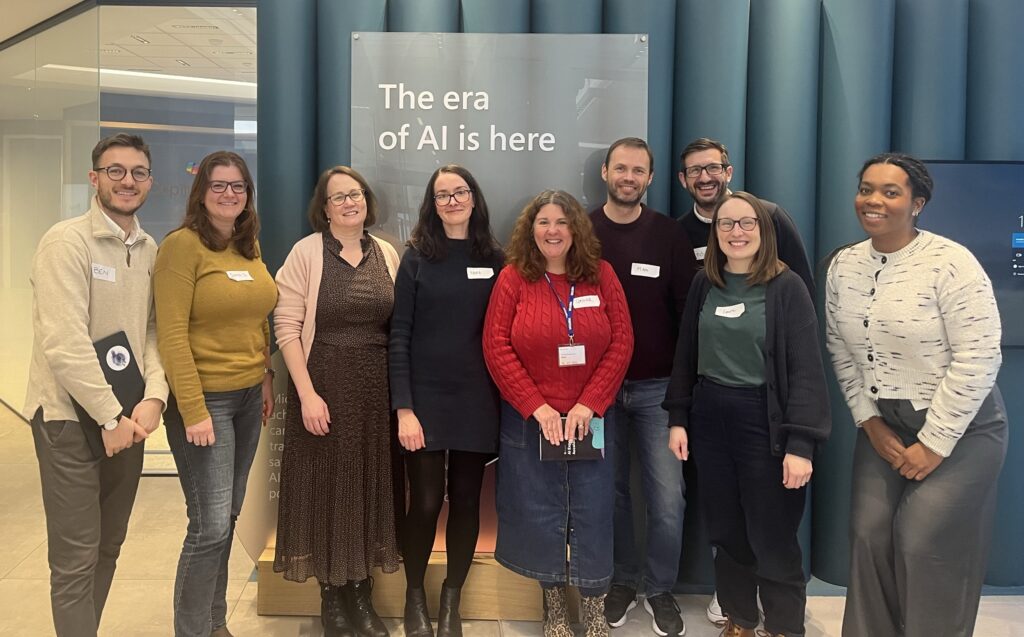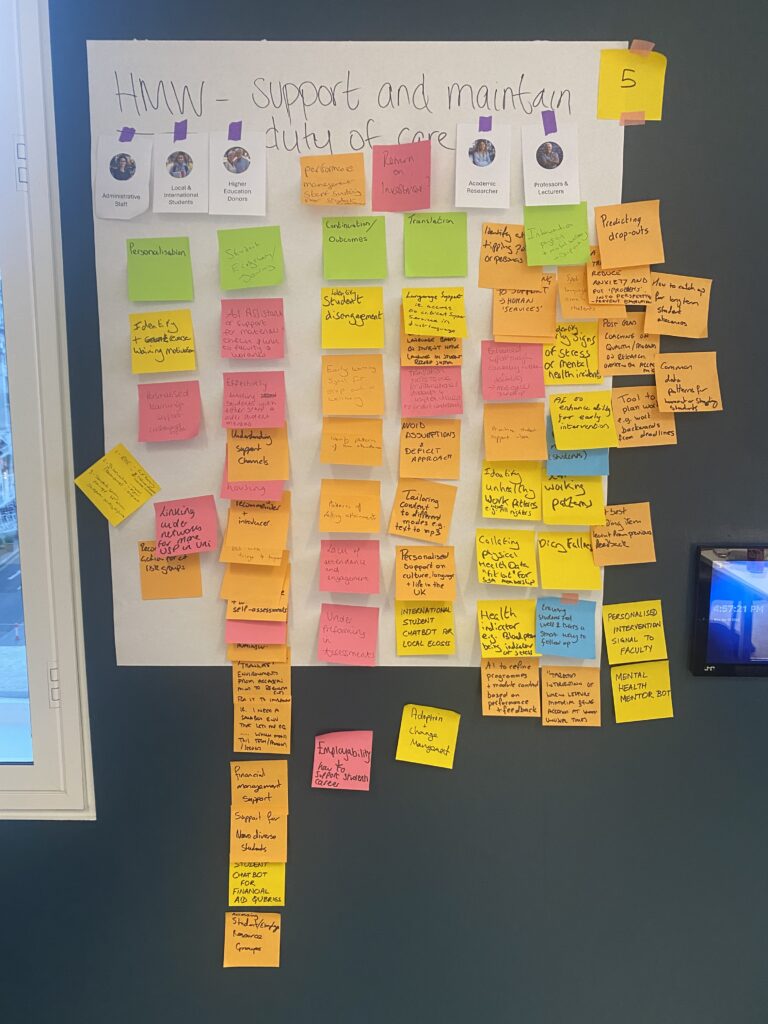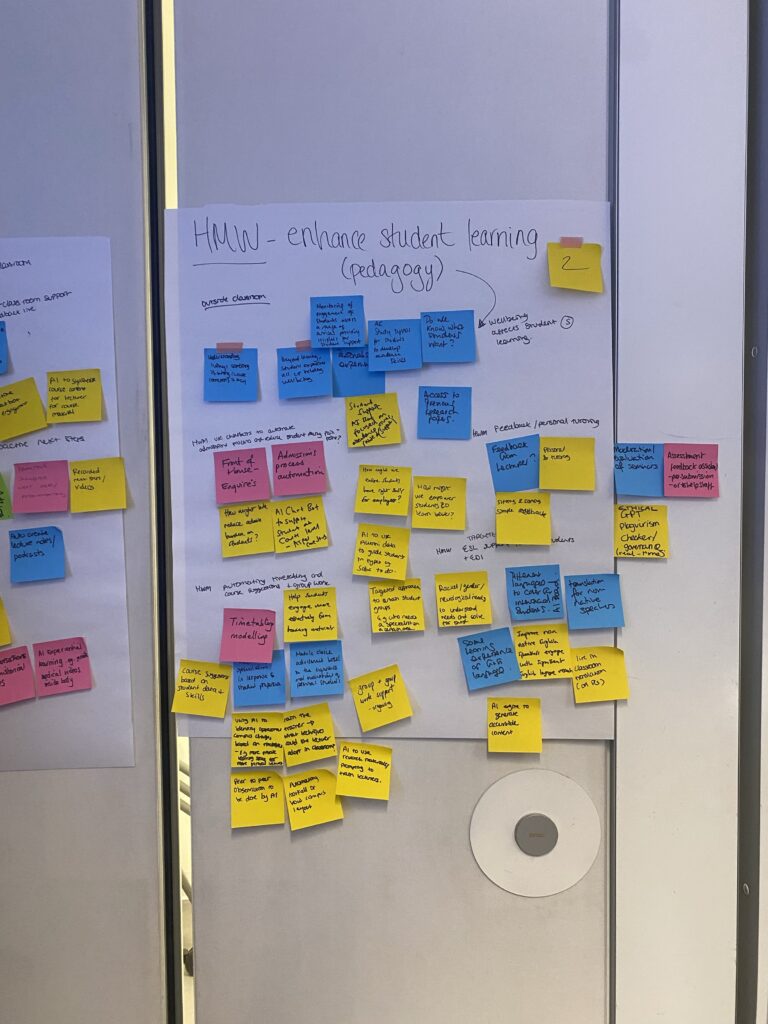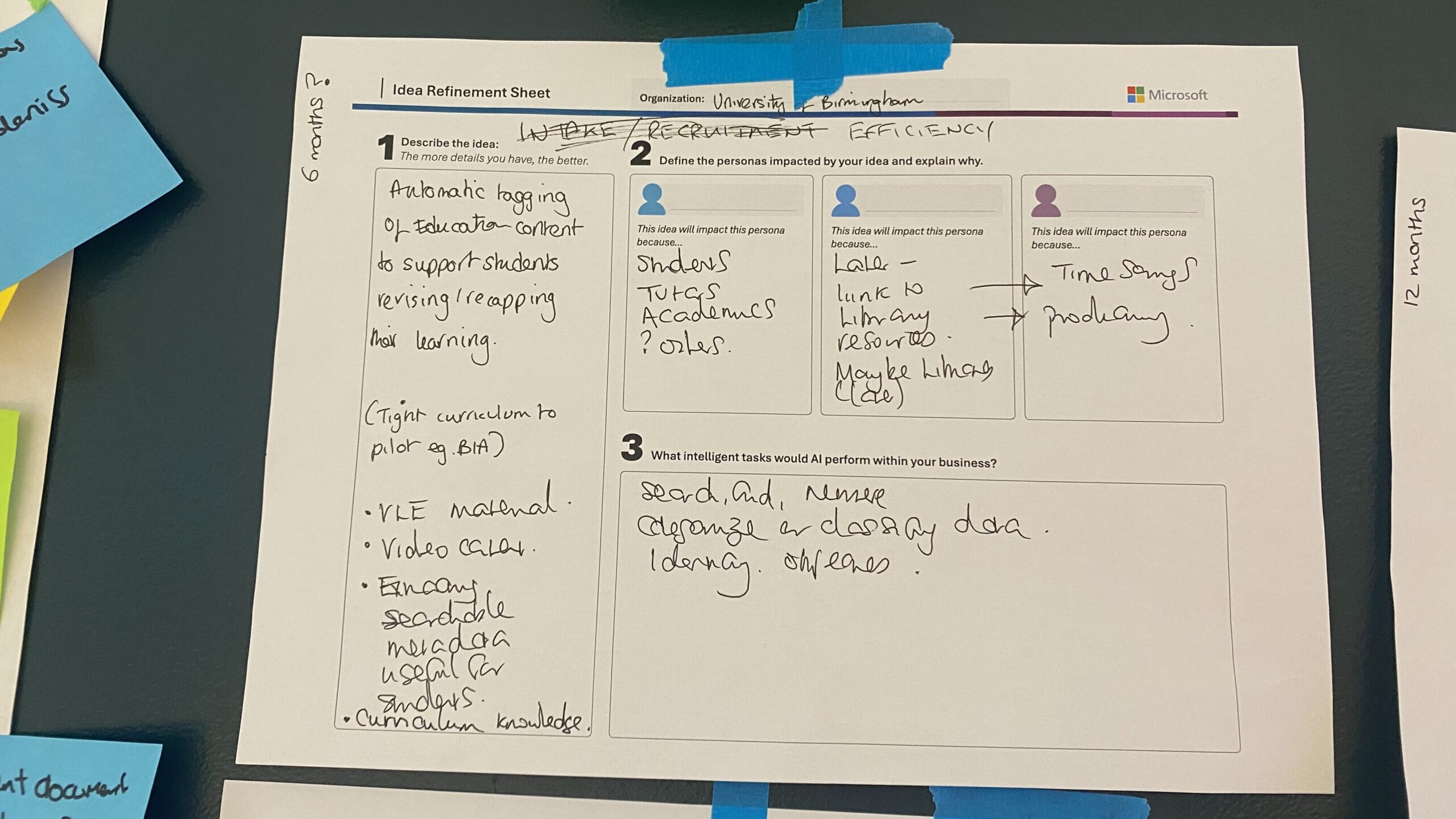Recently, I had the privilege of attending a two-day AI Accelerator workshop alongside colleagues from the University of Birmingham (UoB), Microsoft staff, and representatives from other higher education institutions across the UK. This workshop was a fantastic opportunity to delve into the potential and challenges of AI in the education sector. It provided a platform for rich discussions and idea-sharing, aimed at exploring how AI can transform various aspects of higher education.

The workshop’s objectives were to identify key areas where AI could be implemented, understand the current barriers to adoption, and develop actionable plans to leverage AI effectively. By bringing together diverse perspectives from different institutions, the workshop fostered a collaborative environment where participants could share insights, brainstorm innovative solutions, and learn from each other’s experiences.
Pre-Sessional Insights
Before the workshop, pre-sessional discussions highlighted several key points. There was a general lack of understanding of what AI can do for us, coupled with financial constraints that necessitate a clear return on investment (ROI) for AI initiatives. Additionally, there was a pressing need to improve data, systems, and processes to fully leverage AI. These insights set the stage for our discussions and activities over the two days.
Workshop Format
The workshop was structured over two days, each with a distinct focus. On the first day, we began with introductions, leaving job titles at the door to foster open and unbiased discussions. We then summarized the pre-sessional findings and engaged in brainstorming sessions based on the identified themes. There was also a presentation on AI use cases in higher education, which provided valuable insights and examples. Following this, we worked on generating ideas for our own institutions. On the second day, we continued brainstorming these ideas and concluded with a deeper dive into the top ideas. We categorized them into short-term, medium-term, and long-term projects, and identified impacted stakeholders and potential AI applications.
Day 1: Diving into Themes
The first day was rich with insights and collaborative discussions. We started by addressing the general feeling of being overwhelmed by AI and the fear of how to successfully adopt it amidst business-as-usual operations. It was reassuring to learn that all institutions are facing similar challenges, with some further ahead in certain areas like co-pilot rollouts and bespoke developments, but all still grappling with data quality issues.
The brainstorming sessions around the five key themes—Administration, Learning & Teaching, Research, Personal Productivity, and Care of Duty—revealed that all institutions share common problems. We discussed these themes and came up with loads of ideas where AI might help, ranging from off-the-wall concepts to simpler solutions. Participants discussed various innovative AI applications, such as chat agents for student tutors, administrative processes, academic support, and machine learning from student engagement data. And yes, there was an excessive use of post-it notes during these sessions, which covered every available surface with ideas and thoughts.


There was also a presentation on AI in higher education, showcasing various use cases and great ideas. The examples of effective prompting and creating AI agents on the fly were particularly impressive, highlighting the diverse and creative ways AI is being integrated into higher education to enhance learning and streamline operations. It provided lots of food for thought.
In our institutional groups, we brainstormed ideas where AI could be used specifically for UoB. This exercise generated numerous ideas, which we categorized into short-term, medium-term, and long-term projects.
Day 2: Institutional Brainstorming
On the second day, we continued refining the top ideas generated on the first day. We focused on identifying who would be impacted by each idea and how AI might be used to help. We also worked closely with our Microsoft partners to discuss where they could assist with knowledge, training resources, and guidance. This collaboration provided valuable insights and support, helping us to develop actionable plans for implementing AI initiatives at the University of Birmingham.

Personal Reflections
For me personally, the workshop clarified the need for three levels of AI implementation at UoB. First, a Vanilla Co-Pilot, which offers an out-of-the-box experience for web interfaces and M365 co-pilot. Learning from other institutions that faced challenges during their initial launch can help us roll out AI successfully. Key considerations include user support, community of practice, and leveraging Microsoft’s extensive resources. Second, Bespoke Co-Pilots, which are custom agents guiding people through processes and interacting with our own data and documents. While we have several use case scenarios, the underlying data infrastructure needs improvement. Third, Bespoke Development, where some ideas require AI to be embedded in bespoke developments, such as essay marking and feedback analysis. These initiatives have generated excitement among other institutions and present significant opportunities for innovation. The AI Accelerator workshop was a great start in identifying where the opportunities lie and how we can prioritize them. It was particularly valuable to talk with colleagues from UoB whom I don’t usually work with. They viewed AI differently from myself, taking a more holistic view compared to my technical solution-focused perspective. It was also good to speak with representatives from other universities and realize that we are all in the same boat. Meeting with Microsoft staff was enlightening, as it made me realize the support they can offer. This experience reinforced my belief that AI is a massive opportunity for UoB that needs to be seized. Our innovation team will undoubtedly be extremely busy moving forward, and while we are a very valuable resource to the university, there is a lot to do, and our team is too small to do it all.
Next Steps
Moving forward, we need to follow up with Microsoft subject matter experts to explore available technologies. Developing a clear plan for rolling out AI initiatives, including user support and community of practice, will be crucial. Leveraging Microsoft’s resources to maximize the impact of our AI projects and continuing to collaborate with other institutions to share insights and best practices will also be key. The future is incredibly exciting, with AI presenting a wealth of opportunities for innovation and improvement. There’s a lot of work ahead, but with the right strategies and collaborations, we can achieve great things.
